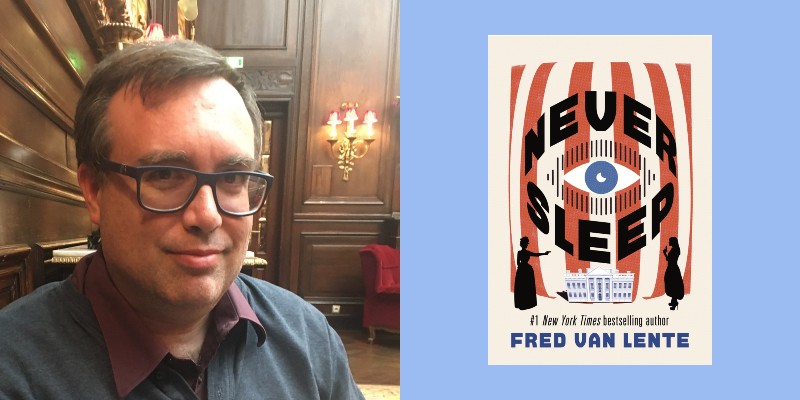Fred Van Lente and I have a lot in common. We both write comics, that’s an obvious one. But we also spend a lot of time in the world of prose — crime fiction, to be exact. Like me, Fred has written a pop culture adjacent murder mystery — The Con Artist, a crime novel set at a comic book convention, felt very much in conversation with my own comic book noir, Secret Identity. Now, Van Lente is back with a historical noir that weaves through actual history – Never Sleep.
Never Sleep is set in and around the Civil War and spotlights the first female agents in the Pinkerton National Police Agency, wo come together to derail an assassination attempt on President Lincoln. We watch the mystery unfurl through the eye of detective Kate Warn, the first-ever female detective in American history, as she also begins training her newest protégée, Hattie. Their efforts to save Lincoln make for quite the page-turner, and oe that’ll reel in mystery and history buffs alike.
I had the pleasure of reading the book early, and because of our shared experiences, I thought it’d make for a lively conversation. Never Sleep is the kind of historical adventure that keeps you on edge, but also gives you a tutorial on what came before. Van Lente has a knack for compelling characters, which fuel the pace and plot. It was a blast to chat with him about it.
ALEX SEGURA: Fred, great to chat with you. Can you give us the big picture on NEVER SLEEP?
FRED VAN LENTE: Never Sleep is a book I’ve worked on for many years. Like most ideas, it’s got many parents, but one of the main ones is this Pinkerton undercover agent Sarah Paulson played on one of my all-time favorite TV shows, Deadwood.
Paulson was pretending to be a servant for the female lead, Molly Parker, while trying to get dirt on her. She was devious, ruthless, and sexy, and even though she was a villain, I was like, “What’s her story? What if rather than trying to rip off poor Molly Parker, she was on the side of the angels?”
SEGURA: That’s interesting. So did that spin out into the book? What other influences were you juggling?
VAN LENTE: From my background in comics I’m used to working in the heroic idiom, but my favorite kind of hero stories are the villain tuned good — the wolf becomes a shepherd.
So if that’s the mother of the idea (to strain this metaphor beyond necessity), the second parent came when I was working on a graphic novel about Abraham Lincoln for HarperCollins, and I learned about Kate Warne and the Baltimore Plot, which was this attempt by Confederate sympathizers to assassinate Abraham Lincoln as he was traveling across the country by train to Washington for the inauguration.
Kate was the first female private detective in American history that we know of, and she started working for Allan Pinkerton a few years before the war started. Very little is known about her, and we historical novelists love to hear that — a blank canvas rubbing elbows with the famous.
SEGURA: Can you tell us more about Pinkerton and that era?
VAN LENTE: Pinkerton basically made his entire reputation on the Baltimore Plot, and constantly associated himself later in his career with the beloved Lincoln, even though a lot of commentators at the time accused him of making the whole thing up. (In Never Sleep, it’s all too real.) A lot of my book is derived from his, um, let’s call it colorful account in The Spy of the Rebellion.
The Pinkertons have a problematic and complicated history that Deadwood was dipping into.
Allan Pinkerton basically invented the concept of the private detective in real life, and ex-Pinkerton Dashiell Hammett basically invented the concept of the private detective in fiction.
SEGURA: I’d love to hear more about your take on the PI concept.
VAN LENTE: The hard-working blue-collar private eye, fighting for the little guy, very much only exists in fiction. As with most things with the word “private” in the name, private detection is largely for the rich, and to enforce the interests of the rich. Later on, after Allan Pinkerton died and his sons took over his firm, his name would be notorious for union-busting, strike-breaking, and the imprisonment and often just straight-up murder of union leaders.
SEGURA: That sounds fascinating.
VAN LENTE: Yeah – though that’s all a bit in the future from when Never Sleep takes place, still, most of Pinkerton’s clients in the 1850s and 1860s were railroads and banks. Kate’s job to save Lincoln doesn’t come from the US government, but from the railroad itself, which is worried about saboteurs. So there’s that the theme of the person working on the dark side coming into the light again—Kate, a born cynic, actually finds herself believing in the cause of defending the Union and, Lincoln, in something bigger than herself. And as any operative will tell you, it’s when you stop listening to your basic instincts is when you’re in the most danger of getting killed.
SEGURA: Can you give a little context on what it was like for Kate, being a female detective in that era?
VAN LENTE: What was even more interesting about the story to me was that Kate wasn’t the only female detective on the case—there was another Pinkerton operative named Hattie Lawton (MacLaughlin in my book) who was undercover, pretending to be another agent’s wife, in this little railroad town along the route.
SEGURA: Was that what grabbed you most? Just that backdrop and setting?
VAN LENTE: I loved that. I have this ruthless Paulson character, and what if she now has a protege? How does the first female private detective train the second, and they have to then go off and save the president-elect of the United States from white supremacists? Yes, please. That’s drama.

















